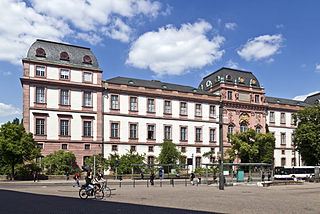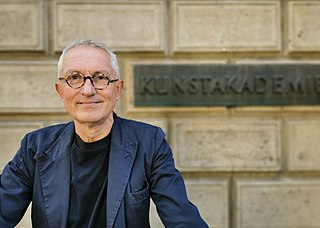Related Research Articles

Wolfgang Wahlster is a German artificial intelligence researcher. He was CEO and Scientific Director of the German Research Center for Artificial Intelligence and full professor of computer science at Saarland University, Saarbrücken. Wahlster remains Chief Executive Advisor of the German Research Center for Artificial Intelligence. In May 2019, he was honored by the Gesellschaft für Informatik as one of 10 most important heads of German artificial intelligence history. He is sometimes called the inventor of the "Industry 4.0" term.

Antje Vollmer was a German Protestant theologian, academic teacher and politician of the Alliance 90/The Greens. She became a member of the Bundestag in 1983 when the Greens first entered the West German parliament, before joining the party in 1985. From 1994 to 2005, she was Vice President of the Bundestag, the first Green in the position. She was a pacifist.

"There is no alternative" (TINA) is a political slogan arguing that capitalism is the only viable system. The slogan is strongly associated with the policies and persona of the Conservative British prime minister Margaret Thatcher.

The Technische Universität Darmstadt, commonly known as TU Darmstadt, is a research university in the city of Darmstadt, Germany. It was founded in 1877 and received the right to award doctorates in 1899. In 1882, it was the first university in the world to set up a chair in electrical engineering. In 1883, the university founded the first faculty of electrical engineering and introduced the world's first degree course in electrical engineering. In 2004, it became the first German university to be declared as an autonomous university. TU Darmstadt has assumed a pioneering role in Germany. Computer science, electrical engineering, artificial intelligence, mechatronics, business informatics, political science and many more courses were introduced as scientific disciplines in Germany by Darmstadt faculty.

The title Footballer of the Year has been awarded in Germany since 1960. Eligible are German players as well as non-German players playing in Germany. In 1996, the title Women's Footballer of the Year was awarded for the first time. Both awards are determined by a poll of German football journalists from the Association of German Sports Journalists and the publication kicker.

The Oper Frankfurt is a German opera company based in Frankfurt.

Hessisches Landesmuseum Darmstadt (HLMD) is a large multidisciplinary museum in Darmstadt, Germany. The museum exhibits Rembrandt, Beuys, a primeval horse and a mastodon under the slogan "The whole world under one roof". As one of the oldest public museums in Germany, it has c. 80,000 visitors every year and a collection size of 1.35 million objects. Since 2019, Martin Faass has been director of the museum. It is one of the three Hessian State museums, in addition to the museums in Kassel and Wiesbaden. Similar institutions in Europe are the Universalmuseum Joanneum in Graz and the National Museum of Scotland in Edinburgh.

The Basketball Bundesliga Coach of the Year is an annual Basketball Bundesliga award that goes to the league's best coach. The award was handed out for the first time in 1989–90 season, to Dirk Bauermann. Bauermann holds the record for most awards won, with four.
Gutmensch is an ironic, sarcastic or disparaging cultural term similar to the English do-gooder. Those who use the term are implying that Gutmenschen have an overwhelming wish to be good and eagerly seek approval—further suggesting a supposed moralising and proselytising behaviour and being dogmatic, while prioritizing "right" and "correct" attitude or sentiment over responsible, balanced, rational and reflected decisions. In political rhetoric Gutmensch is used as a polemic term.
Lying press is a pejorative and disparaging political term used largely for the printed press and the mass media at large. It is used as an essential part of propaganda and is thus usually dishonest or at least not based on careful research.

The Corps Franconia Darmstadt is a fraternity founded on November 16, 1889, in Darmstadt. It is one of the 59 German Student Corps within the Weinheimer Senioren-Convent (WSC), the second oldest federation of classical European fraternal corporations, with roots dating back to the 15th century and fraternities founded in several European countries.
Barbara Ruth Albert is a German chemist and rector of the University of Duisburg-Essen. She was Professor of Solid State Chemistry at the Eduard-Zintl-Institute for Inorganic and Physical Chemistry of the Technische Universität Darmstadt. From 2012 to 2013 she was the president of the German Chemical Society.

Dieter Leisegang was a German author, philosopher, and broadcaster.
The Vereinigung der Vertragsfußballspieler e. V. (VDV) is the professional footballer's union in Germany. It has approximately 1,300 members, playing in the German professional leagues. Nowadays, it is possible that junior footballers at the beginning of their professional careers, can also be members from the age of fifteen. Footballers who have been playing abroad or having finished their career can stay members.

The Residential Palace Darmstadt is the former residence and administrative seat of the landgraves of Hesse-Darmstadt and from 1806 to 1919 of the Grand Dukes of Hesse-Darmstadt. It is located in the centre of the city of Darmstadt. The palace consists of an older Renaissance part and an 18th century Baroque part.

Eric Bodden is a German computer scientist. He holds the Chair of Secure Software Engineering at the Heinz Nixdorf Institute of the Paderborn University and is Director of Software Engineering and IT Security at the Fraunhofer Institute for Mechatronic Design (IEM). He is also head of the engineering department in the Collaborative Research Centre 1119 CROSSING at the Technical University of Darmstadt.
The Youth word of the year is an annual publication which reviews trends in German youth language and names one new or recently popularized word as the most noteworthy. The winning word is chosen by a jury under the guidance of publishing company Langenscheidt, who specializes in language reference works. The competition has run since 2008, but no word was announced in 2019.

Karl-Heinz Petzinka is a German architect, and Rector of the Kunstakademie Düsseldorf. He is known for office buildings in Düsseldorf and Berlin. He converted historic industrial buildings, and was responsible for the section architecture for the Ruhr.2010 project.
The 2022–23 Swiss Super League is the 126th season of top-tier competitive football in Switzerland and the 20th under its current name and format. With this season, the Swiss Super League became the longest continuously running top-flight national league.
References
- 1 2 "Wird Pegida das "Unwort des Jahres"?". Muenchner Merkur. 1 January 2015. Retrieved 16 January 2015.
- 1 2 "Unwort des Jahres beleidigt viele Eltern". Die Welt. 15 January 2008. Retrieved 2 July 2013.
- ↑ "Geschichte – Unwort des Jahres". Unwort des Jahres (in German). Retrieved 10 January 2023.
- ↑ Leppert, Georg (13 January 2020). "Unwort des Jahres: Frankfurter Wissenschaftler erklärt, wie es zum Unwort des Jahres kam". Frankfurter Rundschau (in German). Retrieved 10 January 2023.
- ↑ Gunkel, Christoph (31 October 2011). "Deutsche Sprachpreise". Der Spiegel (in German). Retrieved 10 January 2023.
- 1 2 3 4 5 6 7 8 9 "Die Unwörter von 1991 bis 1999" (in German). Technische Universität Darmstadt.
- 1 2 "Die Unwörter von 2000 bis 2009" (in German). Technische Universität Darmstadt.
- ↑ Schlosser, Horst Dieter (21 January 2003). "Zum 12. Mal "Unwort des Jahres" gewählt" (PDF) (Press release) (in German).
- ↑ Schlosser, Horst Dieter (20 January 2004). "Zum 13. Mal "Unwort des Jahres" gewählt" (PDF) (Press release) (in German). Sprachkritische Aktion Unwort des Jahres.
- ↑ Schlosser, Horst Dieter (18 January 2005). "Unwort des Jahres 2004 gewählt" (PDF) (Press release) (in German). Sprachkritische Aktion Unwort des Jahres.
- ↑ Schlosser, Horst Dieter (24 January 2006). "Unwort des Jahres 2005 gewählt" (PDF) (Press release) (in German). Sprachkritische Aktion Unwort des Jahres.
- ↑ "Unwort des Jahres: "Entlassungsproduktivität"". Spiegel Online. 24 January 2006. Retrieved 2 July 2013.
- ↑ Schlosser, Horst Dieter (19 January 2003). "Zum 16. Mal "Unwort des Jahres" gewählt" (PDF) (Press release) (in German). Sprachkritische Aktion Unwort des Jahres.
- ↑ "Unwort des Jahres: "Freiwillige Ausreise"". Spiegel Online. 19 January 2007. Retrieved 2 July 2013.
- ↑ Schlosser, Horst Dieter (15 January 2008). "Zum 17. Mal "Unwort des Jahres" gewählt" (PDF) (Press release) (in German). Sprachkritische Aktion Unwort des Jahres.
- ↑ Schlosser, Horst Dieter (20 January 2009). "Zum 18. Mal "Unwort des Jahres" gewählt" (PDF) (Press release) (in German). Sprachkritische Aktion Unwort des Jahres.
- ↑ "Sprachkritik: "Notleidende Banken" ist Unwort des Jahres". Spiegel Online. 20 January 2009. Retrieved 2 July 2013.
- ↑ Schlosser, Horst Dieter (19 January 2010). "Zum 19. Mal "Unwort des Jahres" gewählt" (PDF) (Press release) (in German). Sprachkritische Aktion Unwort des Jahres.
- ↑ "Tiefpunkt in einem Baumarkt". Spiegel Online. 17 May 2010. Retrieved 2 July 2013.
- ↑ Schlosser, Horst Dieter (18 January 2011). "Zum 20. Mal "Unwort des Jahres" gewählt" (PDF) (Press release) (in German). Sprachkritische Aktion Unwort des Jahres.
- ↑ "Sprachkritik: "Alternativlos" ist das Unwort des Jahres". Spiegel Online. 18 January 2011. Retrieved 2 July 2013.
- ↑ Janich, Nina (17 January 2012). "Unwort des Jahres 2011: Döner-Morde" (PDF) (Press release) (in German). Sprachkritische Aktion Unwort des Jahres.
- ↑ "'Kebab-Murders' called 'worst word of 2011'". The Local. 17 January 2012. Retrieved 2 July 2013.
- ↑ Janich, Nina (15 January 2013). "Wahl des "22. Unwort des Jahres"" (PDF) (Press release) (in German). Sprachkritische Aktion Unwort des Jahres.
- ↑ "'Victim subscription' worst phrase of 2012". The Local. 15 January 2013. Retrieved 2 July 2013.
- ↑ Janich, Nina (14 January 2014). "Wahl des 23. "Unwort des Jahres"" (PDF) (Press release) (in German). Sprachkritische Aktion Unwort des Jahres.
- ↑ Janich, Nina (13 January 2015). "Wahl des 24. "Unworts des Jahres"" (PDF) (Press release) (in German). Sprachkritische Aktion Unwort des Jahres.[ dead link ]
- ↑ Pressemitteilung: Wahl des 24. „Unworts des Jahres“
- ↑ Erik Kirschbaum (13 January 2015). "Revived Nazi-era term 'Luegenpresse' is German non-word of year". Reuters. Thomson Reuters. Retrieved 16 January 2015.
- ↑ Kate Connolly (6 January 2015). "Pegida: what does the German far-right movement actually stand for?". The Guardian. Retrieved 16 January 2015.
- ↑ "Sprachkritik: "Gutmensch" ist Unwort des Jahres 2015". sueddeutsche.de (in German). ISSN 0174-4917 . Retrieved 12 January 2016.
- ↑ ""Volksverräter" ist das Unwort des Jahres 2016". Der Spiegel (in German). 10 January 2017.
- 1 2 "'Traitor of the people' is Germany's worst word of 2016: Here's why". The Local. 10 January 2017.
- ↑ "Sprachkritik: 'Alternative Fakten' ist Unwort des Jahres 2017". Der Spiegel (in German). Retrieved 16 January 2018.
- ↑ Translated from "Pressemitteilung: Wahl des 27. 'Unworts des Jahres'" (PDF) (in German). Technische Universität Darmstadt . Retrieved 15 January 2020.
- ↑ "Unwort des Jahres 2018" (in German). Technische Universität Darmstadt . Retrieved 10 February 2019.
- ↑ "Klimahysterie ist das "Unwort des Jahres"". Der Spiegel (in German). 14 January 2020. Retrieved 15 January 2020.
- ↑ Translated from "Pressemitteilung: Wahl des 29. 'Unworts des Jahres'" (PDF) (in German). Technische Universität Darmstadt . Retrieved 15 January 2020.
- 1 2 ""Rückführungspatenschaften" und "Corona-Diktatur" sind Unwörter 2020". Die Zeit . 12 January 2021. Retrieved 4 February 2021.
- 1 2 "Press release: Election of the 30th "Unword of the Year" – and a new jury!" (PDF). Technische Universität Darmstadt. 12 January 2021.
- ↑ "Sprachkritische Aktion: »Pushback« ist das Unwort des Jahres". Der Spiegel (in German). 12 January 2022. ISSN 2195-1349 . Retrieved 17 January 2022.
- ↑ "Unwort des Jahres 2022: Dieses Wort wurde von der Jury gekürt". Die Welt (in German). 10 January 2023. Retrieved 10 January 2023.
- ↑ ""Remigration" ist Unwort des Jahres 2023". Tagesschau (in German). 16 January 2024. Retrieved 16 January 2024.